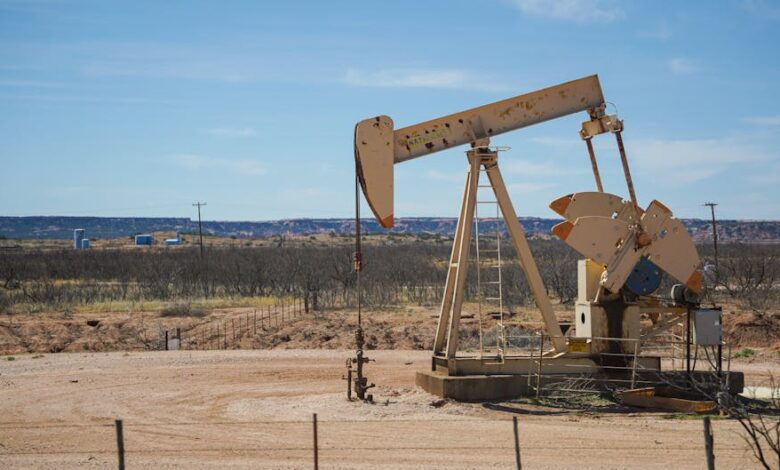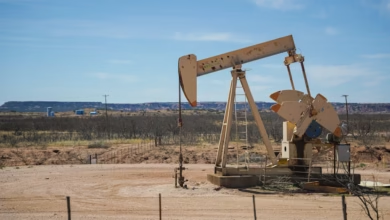Oil Refining 101: Transforming Crude Oil into Fuels and the Future of the Global Oil Market

### Introduction:
In a world increasingly reliant on energy, understanding the complex journey of oil from its raw state to the fuel that powers our vehicles and industries is more crucial than ever. Oil refining serves as the vital process that transforms crude oil into a range of usable products, including gasoline, diesel, and various petrochemicals. This article delves into the intricacies of oil refining, shedding light on how this essential industry operates and its significance in the global oil trade.
As we explore "Understanding Oil Refining: The Process of Transforming Crude Oil into Essential Fuels and Petrochemicals," we'll uncover the sophisticated technologies and methodologies that enhance energy security and meet the growing demand for oil consumption. We will also examine "The Future of Oil: Market Trends, Geopolitics, and the Impact of Shale Oil and Offshore Drilling on Oil Prices," analyzing how shifts in oil market trends, influenced by OPEC decisions and the rise of shale oil, affect oil prices globally.
Finally, we will navigate the complexities of "Navigating Oil Supply Chains: From Exploration and Transportation to Storage and Environmental Considerations," highlighting the various stages from oil field services to oil transportation and storage, while also addressing the environmental impact of oil and the burgeoning interest in oil alternatives and biofuels. Join us on this comprehensive journey through the world of oil refining and gain insights into the dynamics that shape this pivotal sector.
- 1. "Understanding Oil Refining: The Process of Transforming Crude Oil into Essential Fuels and Petrochemicals"
- 2. "The Future of Oil: Market Trends, Geopolitics, and the Impact of Shale Oil and Offshore Drilling on Oil Prices"
1. "Understanding Oil Refining: The Process of Transforming Crude Oil into Essential Fuels and Petrochemicals"
Oil refining is a critical process that transforms crude oil into essential fuels and petrochemicals, forming the backbone of the global energy supply chain. Understanding this intricate process sheds light on how oil is converted into gasoline, diesel, and various other products that power our vehicles, support industries, and fuel economies.
The oil refining process begins with the extraction of crude oil, which can come from various sources such as shale oil, offshore drilling, or oil sands. Once extracted, crude oil is transported through a complex network of oil pipelines and storage facilities to refineries, where it undergoes several refining processes. These processes typically include distillation, cracking, and reforming, each designed to break down the crude oil into its constituent components.
During distillation, crude oil is heated in large towers, allowing it to separate into different fractions based on boiling points. Lighter fractions, such as gasoline and kerosene, rise to the top, while heavier components settle at the bottom. This initial separation is crucial for meeting the diverse needs of the oil market, particularly as oil prices fluctuate and global oil trade dynamics shift.
Following distillation, the heavier fractions can undergo further processing through cracking, which breaks larger molecules into smaller, more useful ones. This is particularly important in producing fuels that meet modern energy consumption standards. The emergence of biofuels and oil alternatives has also prompted refineries to adapt their technologies in order to reduce the environmental impact of oil and comply with increasingly stringent oil regulations.
The downstream oil sector plays a significant role in the supply chains that deliver refined products to consumers. With rising concerns over energy security and the geopolitical implications of oil trade, understanding the dynamics of oil consumption and investment becomes vital for stakeholders. Oil price hedging strategies are often employed by investors and companies to mitigate the risks associated with volatile oil prices.
Moreover, oil refining is not just about fuels; it also produces petrochemicals that are essential for manufacturing various everyday products, from plastics to fertilizers. As the global energy landscape evolves, innovations in oil field services and oil technologies continue to enhance the efficiency of refining processes.
In conclusion, the oil refining process exemplifies the complex interplay of technology, economics, and geopolitics in the energy sector. As we navigate the future of oil and its alternatives, a comprehensive understanding of refining will be essential for addressing both the challenges and opportunities that lie ahead in the ever-changing oil market.
Oil refining is a crucial process that transforms crude oil into various usable products, such as gasoline and diesel, which are essential for everyday transportation and energy needs. The oil refining process not only plays a significant role in meeting the global demand for these products but also directly influences oil prices and the broader oil market trends.
The journey begins with the extraction of crude oil from oil reserves, which can be located in both onshore and offshore drilling sites. As oil is transported through intricate oil supply chains, it is subjected to various refining processes—such as distillation, cracking, and reforming—that separate it into different fractions. These fractions can then be further processed into downstream oil products, including not only fuels like gasoline and diesel but also petrochemicals used in a wide array of industries.
Understanding the dynamics of the oil market is essential for oil investors, particularly as OPEC and shale oil production continuously shape the landscape of global oil trade. The interplay between oil prices and geopolitical factors often drives investment decisions, making oil price hedging a necessary strategy for many stakeholders. The reliance on oil consumption has also prompted discussions around energy security, as nations seek to balance their energy needs with the environmental impact of oil extraction and refining processes.
As various countries explore oil alternatives and biofuels, the future of oil refining will likely involve integrating new oil technologies that aim to minimize the environmental footprint of refining operations. Moreover, with the rise of oil sands and the exploration of natural gas as a cleaner energy source, the refining industry faces both challenges and opportunities.
In the context of oil regulation and compliance, refiners must navigate a complex landscape of environmental policies and industry standards. This regulatory environment not only affects operational practices but also impacts the overall efficiency of oil storage and transportation systems.
In conclusion, oil refining is a multi-faceted process that is deeply intertwined with the global oil trade, influenced by market trends, geopolitical factors, and environmental considerations. As the industry evolves, it will be imperative for stakeholders to adapt to new technologies and regulatory frameworks while considering the long-term sustainability of oil consumption and its alternatives.
2. "The Future of Oil: Market Trends, Geopolitics, and the Impact of Shale Oil and Offshore Drilling on Oil Prices"
The oil industry is at a pivotal crossroads, shaped by a complex interplay of market trends, geopolitical factors, and emerging technologies. As we look to the future of oil, understanding these dynamics is crucial for stakeholders across the global oil trade, from investors to policymakers.
**Market Trends and Oil Prices**
Oil prices are influenced by various factors, including supply-demand dynamics and OPEC's strategic decisions. The rise of shale oil production in the United States has significantly altered the landscape of oil supply chains, providing a robust counterbalance to traditional oil producers. This increase in shale oil output has led to greater energy security for the U.S. and has affected global oil prices, often resulting in price volatility. As oil investments shift towards more sustainable practices, including biofuels and oil alternatives, the traditional oil refining sector must adapt, focusing on improving efficiency and reducing environmental impacts.
**Geopolitics of Oil**
Oil geopolitics play a critical role in shaping the future of oil. Nations with substantial oil reserves, such as those in the Middle East and Russia, wield significant power in OPEC negotiations, directly impacting oil prices and global supply. The ongoing tensions in these regions often lead to fluctuations in oil prices, influencing oil transportation and storage strategies worldwide. Additionally, the push for oil regulation and compliance with environmental standards introduces new challenges and opportunities for the industry.
**Shale Oil and Offshore Drilling**
The expansion of shale oil projects and the resurgence of offshore drilling are reshaping the oil landscape. Shale oil has not only boosted U.S. production but has also affected the global oil market by increasing competition and lowering prices. Offshore drilling continues to be vital for accessing untapped oil reserves, although it raises concerns regarding the environmental impact of oil extraction. As companies invest in advanced oil technologies, the industry must balance profitability with sustainable practices to mitigate the environmental footprint.
**Conclusion**
Navigating the future of oil requires a keen understanding of these market trends and geopolitical influences. As the global energy landscape evolves, stakeholders must remain agile, investing in innovative solutions while considering the environmental impact of oil consumption. The interplay between traditional oil refining and the rise of alternative energy sources will define the next era of oil production and consumption, shaping a more sustainable energy future.
In conclusion, oil refining remains a critical process that transforms crude oil into essential fuels and petrochemicals, fueling our modern world. As we navigate the complexities of the oil market, understanding the intricacies of oil refining not only sheds light on how gasoline and diesel are produced but also highlights the broader implications of oil geopolitics and market trends. The current landscape, influenced by shale oil developments, offshore drilling, and evolving oil prices, underscores the importance of strategic oil storage and transportation to ensure energy security.
Moreover, as we face increasing scrutiny regarding the environmental impact of oil and rising oil consumption, the transition towards biofuels and oil alternatives is becoming increasingly vital. Investors and stakeholders in the oil industry must stay informed about oil market trends and regulatory compliance to navigate the challenges ahead. By keeping a close eye on oil field services and new oil technologies, we can better prepare for the future of the global oil trade, balancing the need for energy with a commitment to sustainability.
Ultimately, the future of oil refining will depend on our ability to adapt to changing dynamics within the oil supply chains and to embrace innovation while responsibly managing our natural resources. As we look forward, the intersection of oil exploration, production, and environmental considerations will shape the future of the energy landscape, making it imperative to remain engaged in oil price hedging and strategic investments in this ever-evolving sector.
By understanding these elements, we can not only appreciate the significance of oil refining but also contribute to a more sustainable and secure energy future.





